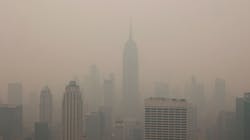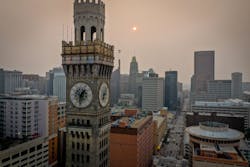Bill Proposes Time Off for Outdoor Workers Exposed to Smoke
Nov. 3—Workers in this country generally enjoy federally required sick days when they're not feeling up to the job. New legislation proposes time off for smoke days too.
A bill introduced in Congress this week by Rep. Barbara Lee, D-Oakland, would require employers to take steps to protect their employees from the bad air caused by wildfires. This includes providing up to 12 weeks of unpaid annual leave — and sometimes paid leave — during periods of heavy smoke to those whose health is seriously threatened.
The proposed safeguards target people who work outdoors, for as little as one hour a day. Among them are farmworkers, construction employees and delivery personnel, potentially including the likes of UPS and Amazon. Many have experienced weeks of harmful sooty air at a time, not only in California and the West but this year on the East Coast as a result of the massive blazes in Canada.
The legislation, which builds upon a handful of existing state laws on smoke exposure, reflects the continuing effort of governments to enact regulation on pace with the impacts of climate change — in this case with the uptick in wildfire.
"The climate crisis has made wildfires increasingly a part of the daily life of Californians, especially for us in the Bay Area," Lee said in a statement to the Chronicle. "But our economy cannot come to a halt each time we deal with the aftermath of wildfires, nor can we sacrifice worker safety."
The bill was co-authored by Raul Grijalva, D-AZ, who serves as the ranking member of the House Committee on Natural Resources, which could take up the matter.
The legislation faces tough odds for approval. Opposition is likely from industry groups and House Republicans, who control the chamber and determine which bills move forward. The initiative has begun getting support, though, from environment, labor and health advocacy groups, including the Sierra Club and American Lung Association.
Dubbed the Smoke Mitigation and Occupational Key Enhancements Act, or Smoke Act, the proposal calls for the Secretary of Labor to establish a new workplace standard for smoky air, enforceable like other federal workplace standards.
To comply, employers would have to monitor the widely-used Air Quality Index to determine when PM 2.5, the fine particles in smoke, are at unhealthy levels — defined as 151 and greater. If the threshold is hit, employers would be required to take a series of protective measures, which depend on the workplace but generally involve lessening smoke exposure by offering respirators, providing indoor areas for employees to retreat to or relocating work sites.
Employees whose health could be jeopardized would have the option of taking time off, up to 12 weeks of unpaid leave, without losing their job or benefits. Employees who have accrued paid leave, such as vacation time, personal days or family leave, could swap in this leave for any of the 12 weeks allotted for bad air.
Those who work on the front lines of emergencies, including wildland firefighters, would not be covered by the legislation.
Exposure to high levels of PM 2.5 is known to be unhealthy. It causes coughing, difficulty breathing and worse. It's been tied to heart attack, stroke and lung cancer, and it carries elevated risk for those with underlying heart and lung conditions, older adults and pregnant women.
"I think it was a wake-up call for many on the East Coast who saw the impact wildfires can have even many hundreds of miles away," said Patrick Drupp, director of climate policy at the Sierra Club in Washington, D.C. "We don't think workers should have to choose when it comes to their health and their jobs, and this bill would protect vulnerable workers."
California already has regulation in place that requires employers in the state to take measures to protect workers from smoke, which served as a model for the federal bill, according to Lee's office.
The state's requirements similarly include reducing smoke exposure through such actions as bringing workers indoors, changing work schedules, reducing work intensity, providing additional rest periods and offering respirators. However, the regulation does not offer the opportunity for leave like the federal legislation.
Reach Kurtis Alexander: [email protected]
___
(c)2023 the San Francisco Chronicle
Visit the San Francisco Chronicle at www.sfchronicle.com
Distributed by Tribune Content Agency, LLC.


